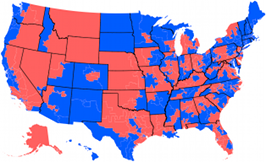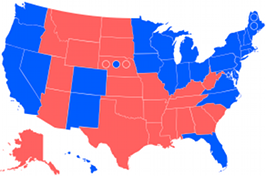Unlikely Voter
Unlikely Voter is a non-partisan site for commentary and analysis on polling, math, science, technology, and policy. It may also go into other directions from time to time.
The site is going to have an open conservative bias. While the site was founded to discuss polling, and took the name for that reason, the name now has a double meaning in that conservatives today have no clear home to vote for.
History
Unlikely Voter was launched on March 15, 2010 with the goal of studying the practice of political polling, the analysis of poll results, and the projections that can be made from aggregated poll analyses. No preconceived models or theories went into the founding of the site. Unlikely Voter is an essay in the true sense of the word: the site will explore the problem space and find conclusions as they present themselves.
However the site went on hiatus in Spring 2014, due to the founder going to taking a full-time desk job, and spending his hobby writing time elsewhere.
That hiatus ended in May 2018, when the hobby writing site he wanted changed directions, and so he needed an outlet. At that time, Unlikely Voter was reborn with new purpose.
The Founder
Neil Stevens is the founder of the site. He does not hide that he is a conservative activist, with the biases that description implies. However his original purpose in writing at Unlikely Voter was not to advance a partisan or policy agenda, but rather to develop neutral tools which aid his activism.
Neil is a lifelong resident of southern California, who moved to northern Virginia in 2012 to take a New Media™ job.
Comments Policy
The Author supports the First Amendment, and the right it gives him to publish whatever content he chooses. All comments will be withheld for moderation unless the commenter has had a comment approved in the past. Comments will be approved at the pleasure of the Author. The use of a valid email address increases the likelihood that a comment will be published. Passive aggression, “snark,” profanity, namecalling, bad faith argumentation, or just getting on the Author’s nerves all decrease the likelihood that a comment will be published.
The Author freely credits Moe Lane with the inspiration for this comments policy.


 House of Representatives Swingometer
House of Representatives Swingometer Electoral College Swingometer
Electoral College Swingometer